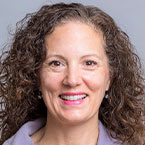By: Alexandra Santana Almansa, MD & Jilda N. Vargus-Adams, MD, MSc, FAAP
As the parent of a young person living with cerebral palsy (CP), you play a daily role in their care and support. Helping them look ahead to adulthood becomes even more important as they move into their teen years. In fact, medical caregivers specializing in CP suggest that families begin planning this transition when their child is around 12 to 14 years old.
Since cerebral palsy affects each person's functioning in a unique way, the plans you make will ultimately depend on your child's abilities and goals. The years ahead may bring waves of change as they explore new possibilities for ongoing study, work and independent living. At age 18, they will officially become adults in the eyes of the medical system—which means it's time to make the transition to a medical team that will support their health over the longer term.
How cerebral palsy can affect adult health
Many people with cerebral palsy adapt to the physical and mental challenges of their condition and enjoy relatively good health. However, CP does create ongoing issues with muscle tone, strength and motor control. It also poses specific health risks at all ages.
Nearly half of all people with CP experience chronic pain.
Around one in 10 have serious vision problems.
Depression risks are 3 to 4 times higher for people with disabilities, including CP.
Most adults with CP age prematurely due to the extra stress and strain on their bodies. This can lead to higher risks for heart and lung disease.
Fatigue is a common issue, because people with CP may use 3 to 5 times more energy than able-bodied people when they walk and move.
Bone and joint problems can lead to arthritis.
Dental health may suffer, since many people with CP have difficulty with the small-motor movements involved in brushing and flossing their teeth.
The right health care team will have experience with these and other health issues common to adults with cerebral palsy. They will monitor your child's health and identify potential issues early, recommending treatments and therapies to ease discomfort and improve quality of life. Team members can also provide care related to your child's sexual and reproductive health.
Creating an adult medical team takes time & care
Teens with cerebral palsy may have been working with the same doctors and therapists since they were small. In fact, the members of this care team may feel like mentors and friends who have helped you and your child in countless ways. Part of making the transition to adult care is taking time to build new relationships with medical caregivers who will see your adult child's unique needs and help them thrive.
Your child's new care team may include specialists in neurology, gastroenterology, orthopedics, rehabilitation medicine and other fields. Your child will need a true
medical home where providers work collaboratively to see and treat the whole person.
Planning your teen's medical transition, step-by-step
Families and teens can work together in shaping the transition from childhood (pediatric) providers to adult providers. The planning process should:
Set a specific age for transferring from pediatric to adult care. Discussions about medical transition to adult care ideally should start between 12 and 14 years of age.
In partnership with your child's doctor, create a clear summary of the child's medical history to date with a list of current caregivers, medications and supplies
Outline possible sources of medical insurance coverage after age 18
List home-based and community-based services the child can apply for (and the timeline to apply)
Part of the conversation will be the level of decision-making support your child will need after transitioning to adult care. They may want to manage their own medical needs independently of you, while being able to ask for support when they need it. Or they may want you to play a more active role, helping with details like scheduling, insurance claims and record-keeping.
Children who live with serious physical or intellectual disabilities may need the comprehensive support of a guardianship. Beginning the planning process early gives you time to explore these options and look for the providers and services needed when your child reaches transition age.
Supporting your child's journey to adulthood
Working on your teen's medical transition plan together can foster healthy self-management. Being part of the decision-making team can help them think about opportunities for ongoing education, independent living and the new relationships they will enjoy as adults.
Having a transition plan can also be helpful in communicating with your current medical team. You can revisit the plan during medical visits and set specific goals to move your teen and family forward. When the time is right, your child's current medical providers can exchange information with their adult providers. You and your teen can review this information ahead of time and provide any input that will help the adult care team understand specific concerns and needs.
Bringing it all together: some questions for the road ahead
As you and your teen begin planning their medical transition, other essential questions may come up. For example:
Do they want to continue their education beyond high school?
What work and career plans are they considering?
Where would they feel most comfortable and safe living?
How do they see their social and family life evolving?
This is a great time to explore ways you can help them build self-sufficiency skills. For teens who want to live on their own someday, it's never too early to begin talking about the basics of personal finance, work-life balance and other issues. Starting in early adolescence will give you the time and energy to explore these topics as they come up, creating a long-term conversation that benefits all of you.
If your teen's level of functioning points to the need for guardianship and income support, starting early will give you time to find the legal and financial professionals who can help you put the necessary agreements in place. Advance planning is a gift to you and your teen, since it reduces stress and assures they will be well cared for in the future.
More information
About Dr. Santana Almansa
 Alexandra Santana Almansa, MD,
is a child neurology resident at Boston Children’s Hospital. She is a member of the American Academy of Pediatrics Council on Children with Disabilities. Alexandra Santana Almansa, MD,
is a child neurology resident at Boston Children’s Hospital. She is a member of the American Academy of Pediatrics Council on Children with Disabilities.
|
About Dr. Vargas-Adams
 Jilda N. Vargus-Adams, MD, MSc, FAAP, is a pediatric rehabilitation physician at Cincinnati Children’s Hospital. She is a member of the American Academy of Pediatrics Council on Children with Disabilities Executive Committee.
Jilda N. Vargus-Adams, MD, MSc, FAAP, is a pediatric rehabilitation physician at Cincinnati Children’s Hospital. She is a member of the American Academy of Pediatrics Council on Children with Disabilities Executive Committee.
|
Editor’s note: William Walker, MD, FAAP, also contributed to this article.